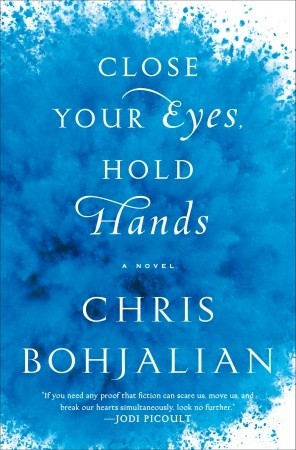‘Close Your Eyes, Hold Hands’ follows life on run after disaster
By Korea HeraldPublished : July 24, 2014 - 20:48

Hold Hands/By Chris Bohjalian
(Doubleday)
Emily Shepard’s famous namesake once wrote that “The Soul selects her own Society ― Then ― shuts the Door.” Shepard, the runaway Vermont teenager who narrates Chris Bohjalian’s new novel, “Close Your Eyes, Hold Hands,” is just as choosy.
Surprisingly, one of the few companions that Shepard ― a cutter, dope smoker and OxyContin popper, and sometimes a reluctant “prositot” for truckers ― selects is Emily Dickinson, the Belle of Amherst. Shepard leans on Dickinson’s poetry and life story the way other teens might lean on rap music or the Bible: as a source of inspiration and pleasure, and as a filter for trying to make sense of her own experiences.
If you’ve already formed a mental Polaroid of Shepard based on my description of her, I suggest you tear it up. She’s more complicated than that ― more innocent, wiser and possibly mentally ill. “As you have no doubt figured out by now, judgment ― and what we call good judgment ― is not topmost in my skill set,” she reports near the end of her heartbreaking adventures.
She’s on the run because a nuclear plant in northeast Vermont has melted down catastrophically, killing 19 people and devastating the immediate area. She hears and fears almost immediately that her father, a casualty (along with her mother) and one of the plant’s main operators, is being blamed for the disaster. She’s afraid that she’ll be forced to testify about her father’s drinking problem, and that public vengeance will descend upon her. As unfair as that may sound, could any of us honestly look into her eyes and say, “Oh, Emily, that would never happen”?
After introducing this big what-if premise, Bohjalian (whose many novels include the Oprah favorites “Midwives” and “The Sandcastle Girls”) writes about the nuclear aftermath in a scrupulously realistic way. He doesn’t blow the slightest apocalyptic or dystopian wind on those fuel rods. It’s nonetheless a scary scenario, the frightening flip side of every Homer Simpson mishap that millions of us have laughed at.
Emily Shepard’s life as a runaway is scary, too, and disheartening. At 5 feet 2 inches tall, she’s hardly equipped to fight off meaner denizens of the streets. Documentless, she has few clean options for surviving without turning herself in. Orphaned and miles from her irradiated home, she has no trusted adult to counsel her to walk through that fear of being known for who she is.
But she has inner resources, including a sense for danger that develops quickly. While admitting the option of killing herself exists, she finds purposes for living ― in particular, a maternal desire to protect Cameron, a 9-year-old boy she meets who has just run away from his third abusive foster home.
They live some of the time in an igloo made of black plastic trash bags filled with wet leaves: “You build the igloos in the day when the leaves are soaked but the ice has melted from the sun, and then they freeze at night inside the bags. So does the water on the outside of the bags; that’s why the bags stick together like glue.”
Cameron won’t go back into the system; Emily fears he will run away again if she tries to force him. Her logic is flawed, of course, but she probably cares more for him than any previous human being has. That she, as a runway teen, can only do so much for him is one of this novel’s sorrows.
Like Emily Dickinson, Emily Shepard is deeply bonded with her dog, and her desire to lay Maggie to rest drives the conclusion of this novel. Dickinson seeps into Shepard’s mind even when she’s thinking about the irradiated Exclusion Zone: The poet suffered from Bright’s disease, which shares some of the same symptoms as radiation sickness.
“Close Your Eyes, Hold Hands” arrives during some intense ― and often wrongheaded ― public chatter about adults who read YA literature. “Close Your Eyes” is a novel for adults ― I don’t think Emily Shepard has enough control over her own fate to label this book YA. But readers of any age who love John Green’s novels might also find Shepard’s story, sobering as it is, an awesome one. (MCT)
-
Articles by Korea Herald










![[KH Explains] How should Korea adjust its trade defenses against Chinese EVs?](http://res.heraldm.com/phpwas/restmb_idxmake.php?idx=644&simg=/content/image/2024/04/15/20240415050562_0.jpg&u=20240415144419)








